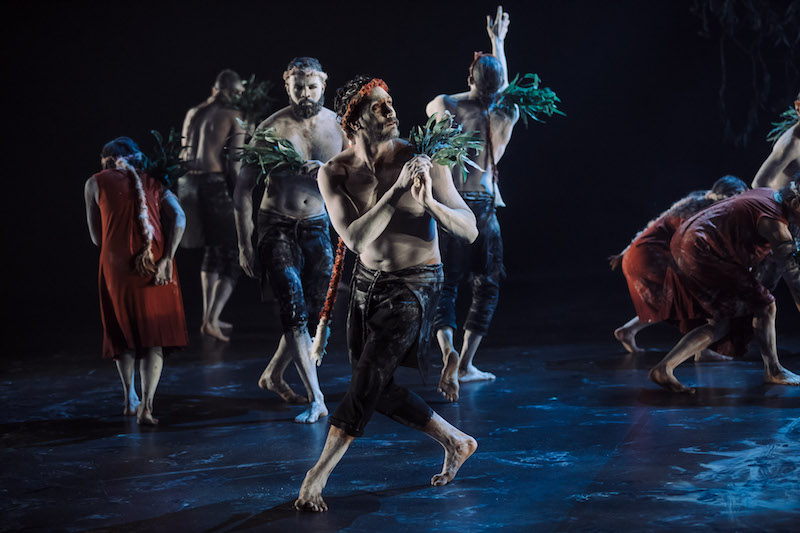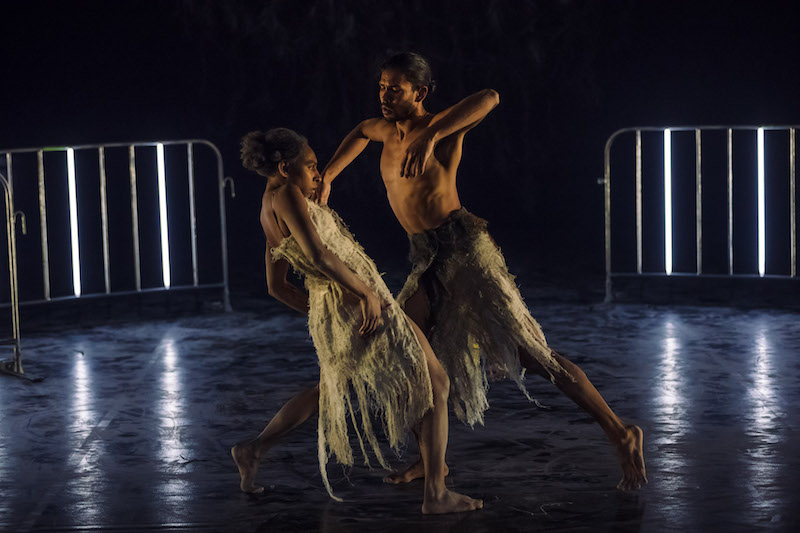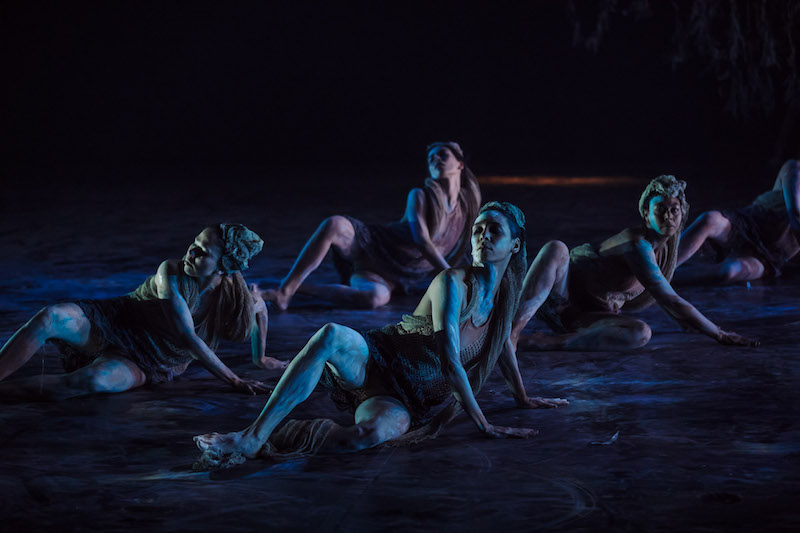Walking into Bay 17, the larger performance space at Carriageworks, you are immediately struck by the huge sculpture hanging over the stage. An enormous net with branches woven through the bottom of it, it is the key piece of set design for all three works in Bangarra Dance Theatre’s latest triple bill, and it works superbly.
Designed by Jacob Nash, it looms out of the semi-darkness, highlighted against the walls of the vast black box space. At times, during the three works, it suggests a tree or creeping vines, at others a ghost net (a fishing net that has been lost at sea by fishermen). Then suddenly it seems to resemble a ghostly figure or spiritual guide under Matt Cox’s exceptionally beautiful lighting. It’s an inspired, arresting eloquent piece of design, triggering high hopes for the evening. But choreographically the programme doesn’t quite rise to meet it.
 Waangenga Blanco and ensemble in Ngathu. Photograph © Daniel Boud
Waangenga Blanco and ensemble in Ngathu. Photograph © Daniel Boud
Bangarra’s latest production ONES COUNTRY – the spine of our stories is a triple bill of new works: Ngathu choreographed by Dujakapurra Munyarryn with Stephen Page and the Bangarra ensemble; Place by Kaine Sultan-Babji; and Whistler by Elma Kris and Nicola Sabatino.
The programme begins with Ngathu. Djakapurra Munyarryun is a Bangarra foundation member and a Yolngu songman. A respected elder from Dhalinybuy in North East Arnhem Land, he has appeared in many of Bangarra’s productions but Ngathu is his first choreographic work for the company.
Inspired by the ngathu (cycad nut) which only appears for a fleeting moment before the wet season, Ngathu begins with two sisters (Deborah Brown and Yolanda Lowatta) emerging from beneath the tree, and collecting woven baskets in preparation for the harvest season. The work then moves between the full ensemble, female ensemble and smaller groups, as the dancers portray the gathering and preparation of the nut. It ends with the two sisters, now ready to carry the knowledge of the cycad nut and pass it on to the next generation.
Performed to an original score by Steve Francis, incorporating didgeridoo, clap sticks, traditional songs by Duakapurra himself, voice by Kathy Munyarryan, and the sounds of nature, Ngathu has the feel of a traditional ceremony or corroboree. With the women in simple orange dresses and the men in black, much of the choreography involves the company moving around the stage in circular patterns. If feels if we are being given a glimpse of something important and meaningful for those involved, but it could be further developed dramatically to add more of a dynamic for audiences.
 Yolanda Lowatta and Tyrel Dulvarie in Place. Photograph © Daniel Boud
Yolanda Lowatta and Tyrel Dulvarie in Place. Photograph © Daniel Boud
ONES COUNTRY then moves to urban Australia with Place, which marks the choreographic debut of Kaine Sultan-Babji who has been a dancer with the company for six years. The contemporary abstract piece draws on his personal experience of what it means to be black and gay in today’s world. Without reading the programme notes, this isn’t obvious from the piece but you do get a palpable sense of displacement and struggle in the work.
Nash’s set design for Place also features interlocking metal barricades, of the kind used for crowd control, with some of the railings illuminated with white light. It begins with six dancers behind them as if trapped. Gradually they struggle their way over the barricades. Sultan-Babji intensifies the ominous atmosphere with a figure in white, who holds her hand over her mouth – a gesture echoed by the ensemble.
Drawing on his family totem, the caterpillar, some of Sultan-Babji’s choreography features fluid, grounded undulating movement. There is also an almost yoga-like quality to some of it. The highlight of the evening is a beautiful duet between Tyrel Dulvarie and Yolanda Lowatta, which stands out for its emotional resonance.
Running 80 minutes without interval, ONES COUNTRY finishes with Whistler, co-created by Nicola Sabatino, who joined Bangarra in 2013, and Elma Kris who has been a dancer there since 1999. Kris has previously choreographed a couple of pieces for Bangarra, but this is Sabatino’s choreographic debut.
 Tara Gower, Rika Hamaguchi, Deborah Brown and Jasmin Sheppard in Whistler. Photograph © Daniel Boud
Tara Gower, Rika Hamaguchi, Deborah Brown and Jasmin Sheppard in Whistler. Photograph © Daniel Boud
Drawing on their shared Torres Strait Islander heritage, Whistler is another contemporary abstract piece inspired by the sacred call of the dugong (the totem of both their families) and its significance to their people. Tracing the life and mating cycle of the female dugong, much of the choreography has the dancers on the ground again, as if swimming or drifting in the ocean, and playfully sliding and rolling over each other. Coming after the caterpillar section of Place, it does feel rather similar in style.
All three works are superbly costumed by Jennifer Irwin and beautifully lit by Matt Cox, with evocative scores by Steve Francis. The dancing is also exceptionally strong. But each piece feels as if it there is room for further development choreographically. ONES COUNTRY doesn’t have the choreographic invention, emotional resonance or dramatic force of the best Bangarra productions. But it’s good to see the company investing in the development of new voices, and there is more than enough to make ONES COUNTRY a worthwhile experience.
ONES COUNTRY – the spine of our stories plays at Carriageworks until December 2












Comments
Log in to join the conversation.